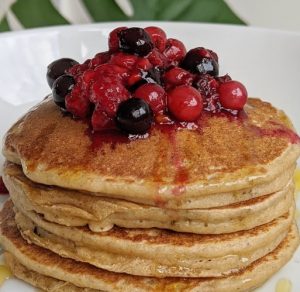
Why is it so important to reduce the amount of sugar that we eat?
As a nation, we are eating too much sugar. Reports show that sugar contributes to 12 to 15% of our energy – however, we are consuming more sugar than we need. The reason why it is important to reduce this is because consuming too much sugar can lead to greater risk of obesity, tooth decay, and other related health problems, such as type 2 diabetes. There is also some evidence to show an association between consuming excess sugar and high blood pressure, some potential cancers, and non-alcoholic liver disease.
Are there different kind of sugars?
Yes – the first is free sugars. This is the type of sugar that we are aiming to reduce in the diet. It is recommended that free sugars account for no more than 5% of our daily food intake.
Free sugars include all sugars that are added to food, such as cakes, biscuits, sweets, soft drinks, unsweetened fruit and vegetable juices, syrups, honey, pastes, and purees.
This does not include the sugars naturally found in dairy such as milk, cheese (lactose), fruit, and vegetables (fructose), as these sugars are still intact – for example, they have not been broken down into a juice or smoothie.
A question that many people ask is: why does the sugar in fruit juices and smoothies come under free sugars when they are naturally occurring?
This is because, when drinking smoothies and juices, it is a lot easier to have a large amount compared to eating whole fruits. This can not only lead to consuming a greater number of calories and sugar, but blending or juicing fruits and vegetables also reduces the fibre content, resulting in a faster rise in blood sugars levels. It is therefore recommended to keep to a portion size of 150ml per day.
How can we make little changes to reduce the amount of sugar we eat?
Making small and sustainable changes in our diet is the best way to reduce the amount of sugar we eat. Sometimes, if we make too big of a change, it can leave people feeling overwhelmed. Therefore, making small steps that you are likely to follow and will eventually become habits are the best way forward. These changes could be:
- Making your own pasta sauce using chopped tomatoes rather than shop bought sauces (which can contain more than 13g of sugar!).
- Reducing sugar in your tea and coffee by half a teaspoon.
- Reducing the amount of times in a week you have condiments and sauces you have with meals, such as ketchup.
- Swapping soft drinks, juice drinks, and flavoured milk drinks to water, lower-fat milks, and diet, sugar-free or no added sugar drinks.
- Aim to get a good night’s sleep. When we feel tired, our bodies tend to crave more energy-dense foods such as sugary foods.
- If you find that you are tempted by sugary foods being in the house, try not to buy these foods when shopping in the supermarket.
- Check the traffic light system to see sugar levels and aim for products with green and amber colours, not red. Look out for other words to describe sugar on ingredients lists, such as glucose, maltose, sucrose, dextrose, honey, syrups (e.g. high fructose corn and maple syrup), and agave.
Can an unhealthy diet link to feeling run down?
For our bodies to function to the best of their ability, we must fuel them correctly! If a person is not eating enough nutrient-rich foods, we may lack important vitamins and minerals, which in turn can affect energy, mood, and brain function.
Making sure that we consume plenty of fruits and vegetables, wholegrains, and proteins (such as oily fish) will give us a good supply of nutrients for not only a good mood but also good health. Regular physical activity as part of a healthy lifestyle also contributes to a healthy body & mind.
Do you have any low-sugar recipes that you recommend?
Banana and oats fluffy pancakes
Ingredients
- 1 banana
- 100g of oats
- 2 eggs
- 2 small drops of vanilla essence (optional)
- 2 tsp of baking powder
- 125ml of milk of your choice
Recipe
- In a blender whizz together all your ingredients until smooth.
- Leave to stand for 10 to 15 minutes – this will help the mixture thicken so that your pancakes get that fluffy texture!
- Once thickened, heat a non-stick pan over a medium heat and add a small amount of oil
- Once heated add around 2 tbsp of your mixture into the pan and cook for one to two minutes until the base of the pancake sets or when air bubbles start to appear on the top.
- Flip onto the other side and cook for around a minute.
- Repeat this process and top with some fresh fruits!
At Cromwell Hospital, we have a world leading nutrition and dietetics team that can help with assessing, diagnosing, and treating a range of dietary and nutritional problems.


